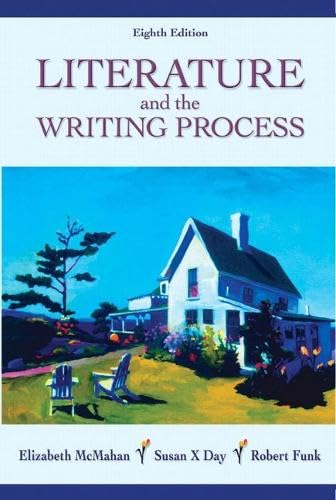For Introductory Literature and Composition classes.
By combining the elements of a literature anthology with those of a handbook, Literature and the Writing Process guides students through the interrelated process of analytical reading and critical writing.
Throughout decades of combined teaching and writing experience the authors of LIterature and the Writing Process have held to a simple premise: great literature is always thought-provoking, always new; why not utilize it to sharpen critical thinking and improve writing skills? Grown out of this long-standing interest in the possibility of integrating the study of literature with the practice of composition, Literature and the Writing Process has become a unique and time-tested staple in literature and composition classes. By seamlessly integrating literature and composition into one multi-purpose text, this approach serves the dual process of enabling students to enjoy, understand, and learn from imaginative literature; and to help them write clearly, intelligently, and correctly about what they have learned.
I very much like the support for the writing process. This text has the best support of any introduction to literature text that I have seen. I think it is good to divide the discussion of the writing process among several chapters. I like the reminders of the process throughout all chapters.
–Denise Nemec, NorthwestArkansasCommunity College
Literature and the Writing Process, Eighth Edition reinforces the writing process in every chapter and is designed to guide you through the complementary processes of active reading and critical writing. Literary selections promote active reading and are used to help you read, analyze, and write about literature. Critical writing coverage, including responsive writing topics, critical writing topics, and researched writing topics, are featured in every chapter. A Handbook for Correcting Errors rounds out the book and offers important grammatical pointers for writers.
New to this edition:
- Chapter 4 features updated and expanded research coverage, including additional material on the use of quotations, paraphrases, and summaries.
- Chapter 18 on cultural analysis helps you understand and interpret literature
- Discussion and writing questions follow all selections in the three anthologies, and at the end of the portfolios, casebooks, and the “Paired Poems for Comparison”
- Additional visuals include an updated color insert and several new photographs and images chosen to enhance the reader’s understanding and appreciation of particular literary works.
- New casebook on interpreting Troy Maxson, the lead character in August Wilson’s Fences.
- Two new groupings of related works for thematic or genre study: a Portfolio of Humorous Stories and a Portfolio of War Poetry
![]()
